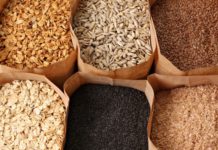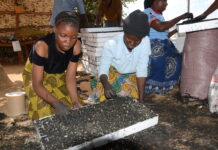By Zablon Oyugi
A new report released by the Thabo Mbeki Foundation (TMF) in partnership with the Andrey Melnichenko Foundation, has revealed that poor and imbalance fertiliser supply is worsening the world’s most vulnerable countries’ food insecurity situation.
The report, “Major changes in the fertilizers market in 2022-2023 and their impact on global food security” unveiled during the November 24th–26th 2023 first edition of Cape Town Conversation, an annual South Africa-based platform that brings together key stakeholders and new voices further proposed recommendations to urgently address the situation.
According to the report, the crisis fueled by a number of current trends that include COVID-19 pandemic, climate change and conflicts, has been escalating as the conflict in Europe, and the subsequently imposed limitations on global trade that decreases fertilizers supply globally and hence drives up the costs of food and fertilizers.
As a consequence, hunger globally has reached unparalleled levels, with the direst situation observed in sub-Saharan Africa and Asia. In 2022, the number of people facing acute food hunger reached 262 million in Sub-Saharan Africa. Without any support measures and given the current trend, it can reach a dramatic 400+ million by 2026 in sub-Saharan Africa.
“We are at a critical crossroads, the world is facing the worst food crisis in decades, particularly in several regions of Africa. The reduction of fertilizer supplies together with their increased prices leads to a surge in global food prices and to a multidimensional crisis: degradation of farms’ crop yields, rising poverty and health issues, decreased access to food, regional GDP slowdown, political unrest, and social conflicts. We are fast approaching a tragic situation. We need to act collectively and urgently,” emphasized Max Boqwana, CEO of the Thabo Mbeki Foundation, which aims to be the catalyst for the achievement of an African Renaissance.
Global fertiliser supply decline
The decline in global fertilizer supply led to significant price shifts – at their peaks in spring and summer 2022, fertilizer prices were approximately 100-200% higher than their 2021 annual averages.
Various trade restrictions following the implementation of sanctions to fertilizers producers and related limitations have led to a global disruption in the whole fertilizers supply chain, which directly reduced global supply by 16 million tons in the period between March 2022 and April 2023.
Combined with other production and trade disruptions (including rising production costs, trade barriers imposed by Russia and China to protect domestic markets and global conflicts among others) the global market was deprived of more than 40 million tons of fertilizers and ammonia cumulatively.
The research points to a redirection of trade flows in favor of the US and Europe, with these two markets drawing an estimated 2 million tons of fertilizers away from sub-Saharan African market in 2022.
This, coupled with the 85% increase in the cost of imported fertilizers, in turn has led to a drop in use of fertilizers in the regions and an immediate hike in the number of people facing acute hunger.
Sanctions have led to negative market consequences
The report provides thorough economic analysis of how, despite the European Union’s desire to support fertilizer supplies, the sanctions regime and, above all, personal sanctions against individuals allegedly involved in the fertilizer sector, have led to negative market consequences.
“Last year we saw how sanctions and other artificial restrictions on trade have led to an imbalance in a highly interconnected market, resulting in the sharp increase in fertilizer prices and severe supply shortages. Fertilizer producing companies and transportation service providers were able to earn good money from this imbalance, which occurred at the expense of consumers in the most vulnerable regions of the world,” said Ilya Tipunin, Director General of Andrey Melnichenko Foundation.
“This imbalance cannot be corrected manually. The value of this report is that it illustrates with facts and figures why this happens and how to fix it. We urgently need to find a systemic solution to stop worsening of food security in the most vulnerable communities, in order to get back on track towards the Sustainable Development Goal 2 – Creating a world free of hunger by 2030,” added Tipunin.
Restoring the balance
The report finally explores several paths to restore the balance in the fertilizer market, firstly by starting a public discussion involving all the stakeholders to assess the situation at the international level, and then by taking effective steps to lift restrictions on fertilizer supply, compensate the most affected countries and prevent similar crises in the future.








